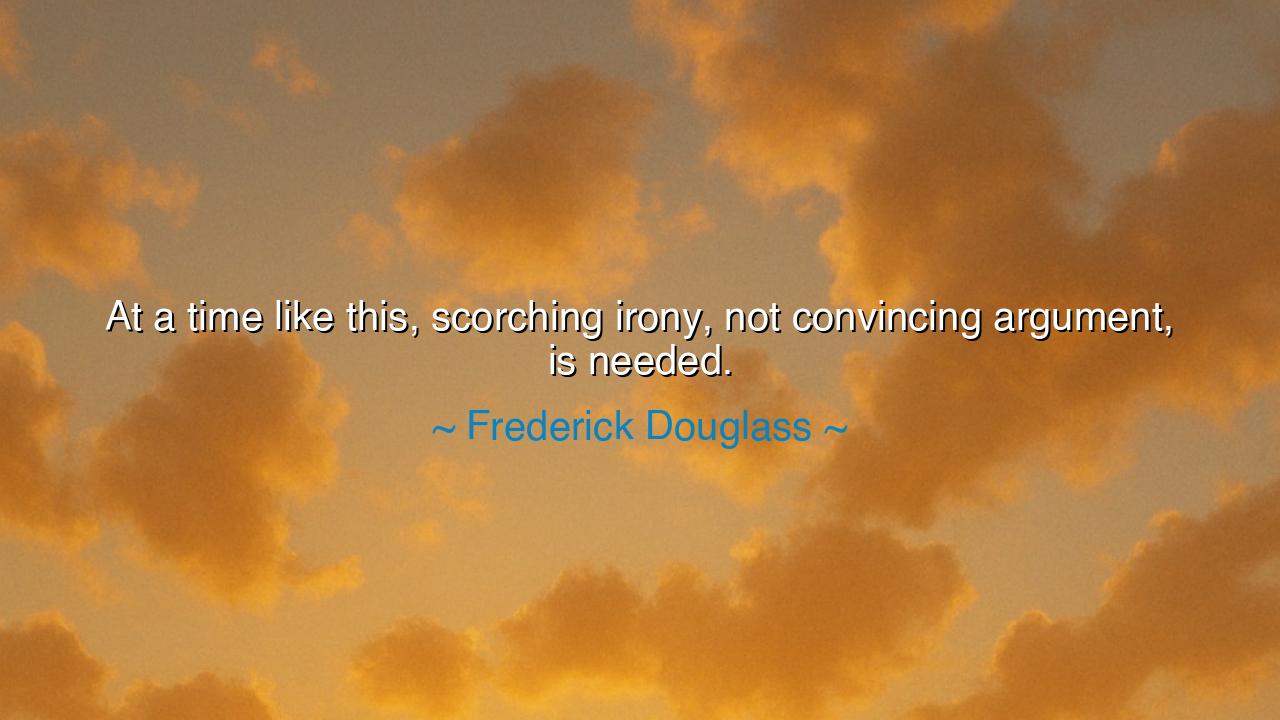
At a time like this, scorching irony, not convincing argument






Frederick Douglass, the prophet of freedom, once proclaimed with fire: “At a time like this, scorching irony, not convincing argument, is needed.” These words were born in an age of bondage, when men and women were held in chains, and reasoned pleas for justice had long been ignored. Douglass, himself once enslaved, knew that gentle persuasion had no power against the hardened hearts of oppressors. What was required was truth so sharp, so burning, so undeniable that it pierced through hypocrisy like a blade through cloth.
The meaning of this quote rests in the recognition that there are moments in history when reason alone fails. Convincing arguments, carefully laid out, can only sway those who are already willing to listen. But when ears are closed, when injustice is masked in the language of civility, it is scorching irony—a truth clothed in fire, a rebuke wrapped in ridicule—that awakens sleeping consciences. Irony exposes the absurdity of evil by turning its false logic upon itself, leaving no refuge for hypocrisy.
Douglass himself gave this teaching life in his famous speech, “What to the Slave is the Fourth of July?” Standing before his audience, he did not waste time explaining with patient reasoning why slavery was wrong. Instead, he wielded scorching irony, asking how a nation that celebrated liberty with fireworks and hymns could at the same time keep millions in chains. His words seared like flame, for they exposed the contradiction so vividly that no defense could stand against them.
History offers other examples of this fiery wisdom. Consider the writings of Jonathan Swift, who in his satirical essay A Modest Proposal suggested, with biting irony, that the poor in Ireland might ease their suffering by selling their children as food for the wealthy. He did not mean this literally; rather, his scorching irony laid bare the cruelty of British policy, shocking readers into confronting truths they had ignored. Where gentle argument failed, irony cracked the armor of indifference.
The lesson here is that truth must sometimes be delivered with heat. There are times for calm debate, but there are also times for speech that burns, for words that strip away the mask of respectability from injustice. To face tyranny, corruption, or hypocrisy, one must sometimes wield language not as a soothing balm but as a sword. This is not cruelty—it is clarity, a necessary fire that purifies and awakens.
In practice, this means we must learn to discern the moment. When injustice persists despite endless reasoning, do not be afraid to speak with scorching irony. Use wit, sharpness, and courage to unveil the lies of the powerful. But wield this weapon with care—not to wound the innocent, but to expose falsehood. For words that burn must always serve the cause of justice, not the vanity of the speaker.
Therefore, children of tomorrow, remember the voice of Frederick Douglass: there are times when argument is not enough, when only fire will suffice. In the face of oppression, dare to speak with the flame of truth. Let your words sear away pretense, let them burn through hypocrisy, let them awaken the sleeping. For when the time calls not for gentle persuasion but for righteous fire, to remain mild is to remain silent—and silence, in such times, is complicity.






AAdministratorAdministrator
Welcome, honored guests. Please leave a comment, we will respond soon